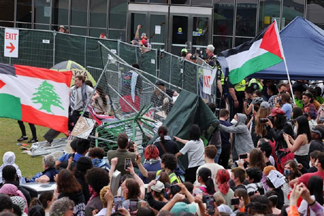
Prahlad Iyengar, also a National Science Foundation fellow, has been “suspended until January 2026,” according to a post on X by a group called ‘MIT Coalition Against Apartheid’
NEW YORK (TIP): An Indian-origin student pursuing PhD at the Massachusetts Institute of Technology (MIT) has been suspended until January 2026 following his pro-Palestinian activism and is currently appealing the university’s decision. Prahlad Iyengar, also a National Science Foundation fellow, has been “suspended until January 2026,” according to a post on X by a group called ‘MIT Coalition Against Apartheid’.
This suspension effectively terminates Iyengar’s five-year NSF fellowship and severely disrupts his academic career, the organization said in the post.
It added that Iyengar, a PhD student in the Department of Electrical Engineering and Computer Science, is “now appealing the decision” to the Chancellor at MIT on Wednesday, the “last opportunity to end this persecution and restore academic dignity”.
“This decision is the harshest among several sanctions resulting from speech-related activities, including an article” that Iyengar wrote for a student-run zine ‘Written Revolution’, “which engaged in debate about the role of pacifism in the pro-Palestine movement”. “This suspension is, in practice, an expulsion, as his readmission is entirely contingent upon approval from the same Committee on Discipline that handed down this harsh sanction,” the body said.
Iyengar is appealing his case with the Chancellor to “revoke or reduce” the “unjust sanctions” against him.
MIT Coalition Against Apartheid said it has launched a campaign to “put pressure on MIT’s administration to “stop criminalizing students who stand on the right side of history”. The organization called on other institutions to support them. In a call to action, the organization is demanding that the MIT administration reverse Iyengar’s suspension before Wednesday and said over 100 people have asked the city of Cambridge’s councilors “to intervene on MIT’s suppression of pro-Palestinian student activism”.
An immigration attorney, Eric Lee, wrote on X that the decision against Iyengar is a “major blow to free speech everywhere. MIT’s admin is so deeply connected to the war profiteers that it cannot tolerate pro-Palestinian speech. This sets the tone for further attacks on speech coming under Trump”.
According to a November 14 report in WBUR, Boston’s NPR News Station, nearly 100 MIT students had rallied on campus after the university decided to ban the distribution of ‘Written Revolution’, described as a pro-Palestinian student-run magazine. The magazine included the article ‘On Pacifism’ authored by Iyengar, who, according to the WBUR report, was also an editor of the magazine.
The WBUR report further said that according to an email sent by MIT Dean of Student Life David Warren Randall to the editors of the magazine, the ‘On Pacifism’ article featured imagery and language that “could be interpreted as a call for more violent or destructive forms of protest at MIT”.
“Randall’s email also cited the inclusion of several images in the article, including one that incorporates the logo of the Popular Front for the Liberation of Palestine, which has been designated by the US State Department as a terrorist organization,” the WBUR report said. At the time, Iyengar was quoted as saying in the WBUR report, “We want to say this is a gross violation of free speech.”
He had added that the purpose of the magazine was to “put out, in our own words, what we were doing, why we were doing it and what was happening on campus”. The WBUR reported that after the publication of the magazine’s October issue, “Iyengar said MIT barred him from entering campus.”
In an email to Iyengar, “the Office of Student Conduct and Community Standards cited ‘a series of continuing behaviors’ that included his essay, a protest held outside a campus lab and an email sent to grad students and postdoctoral researchers who work in the lab,” the WBUR report said.
Iyengar was also suspended last year following the pro-Palestinian demonstrations that had erupted across US universities in the wake of the Israel-Hamas conflict.





Be the first to comment